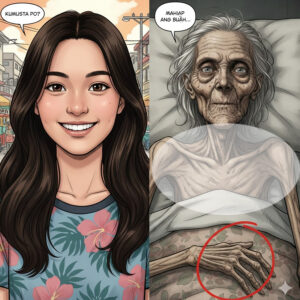Victors made in the City of Champions: ISU World Figure Skating Championship returns to Boston
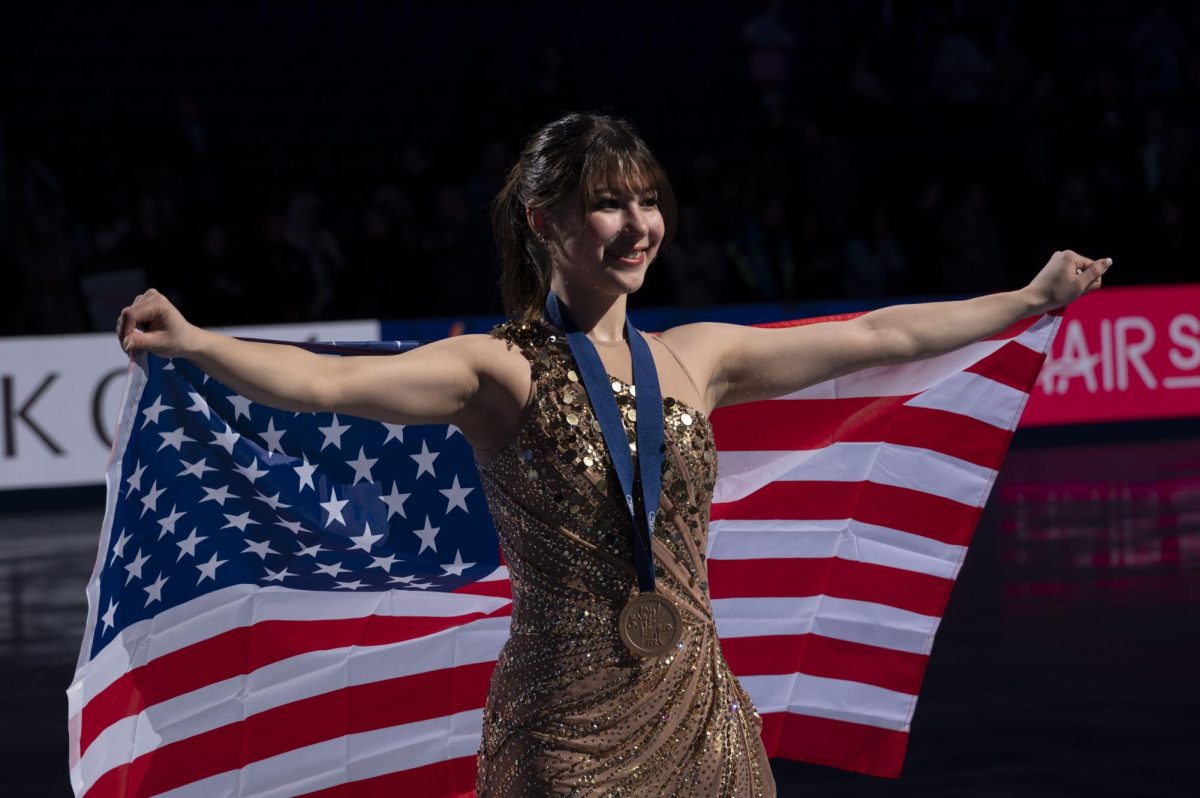
Jessica Xing
Women’s singles winner Alysa Liu proudly wears her gold medal and holds the American flag during the Women’s Victory Ceremony March 28. She performed to Donna Summer’s “MacArthur Park Suite” for her free skate, earning her the World Champion title.
TD Garden exploded into cheers as skates scraped against the ice rink. Music blared from the speakers, stuffed animals littered the arena and sharp gasps echoed whenever an athlete fell. This was only a fraction of the scene at the Ice Skating Union, or ISU, 2025 Figure Skating World Championships, where the U.S. experienced its most successful competition in history with American skaters winning three of the four titles.
The ISU Championship is the most prestigious figure skating competition worldwide. With more than 300 million television viewers and 200 athletes representing 50 countries, the ISU Championship is a monumental event for both skaters and enthusiasts. The competition marks the end of the competitive skating season and this year acted as a qualifier for the upcoming 2026 Olympics.
Countries and cities across the globe bid for the chance to host the ISU championship, but in the end, Boston won, making it the second time the event had been held in Massachusetts since 2016. This year, Massachusetts became the second U.S. state to host the competition more than once (Colorado has hosted five times).
The ISU Championship consisted of four categories spread throughout the last week of March: women’s singles, men’s singles, pairs and ice dancing. Each category was made up of two events, short program and free skate.
Free skating is an artistic program, allowing skaters up to four minutes to perform to the best of their ability. In contrast, the short program consists of a technically advanced piece that only allows performances to be roughly two minutes and 40 seconds.
Boston and international fans alike gathered to watch the women’s short program to kick off day one March 25. The favorites to win were U.S.’s Amber Glenn and Japan’s Kaori Sakamoto, the three-time reigning world champion. But in an upset, USA team member Alysa Liu’s performance to “Promise” by Laufey placed her in first, with Sakamoto and Glenn in fifth and ninth, respectively.
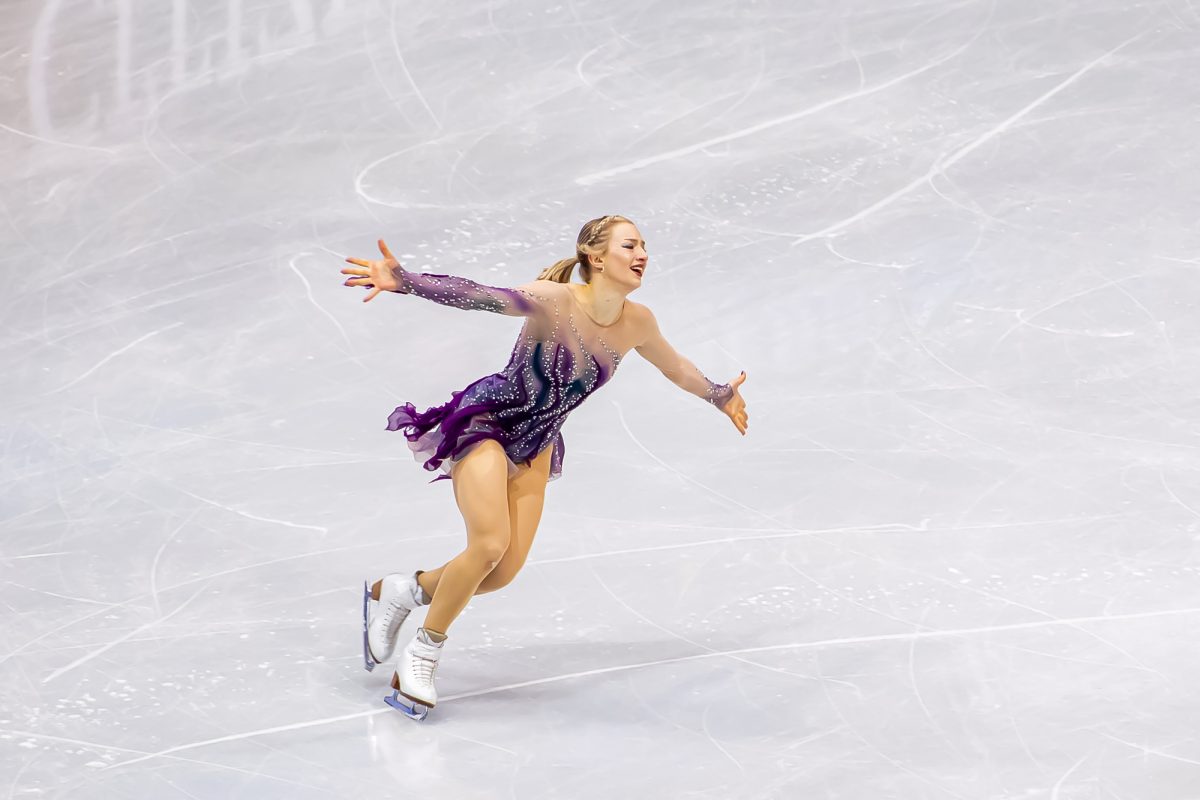 Amber Glenn showcases her skating prowess during her women’s free skate performance March 28. Glenn took fifth overall for her short and free skate programs. (Margot Murphy)
Amber Glenn showcases her skating prowess during her women’s free skate performance March 28. Glenn took fifth overall for her short and free skate programs. (Margot Murphy)
“[Boston] is a city that I think loves skating and has skating in a more accessible format than most,” said Alexandra Poret, Championship attendee and a biophysics doctoral student at Harvard. “It’s cool to see such high-level skaters here in the background of all of that.”
The ISU Championship crown wouldn’t be decided until March 28, two days later, with the women’s free skate program. The points from the prolonged performance are combined with the shorter program, with the total score determining who ultimately claims the title.
In collaboration with the Skating Club of Boston, TD Garden took the time to pay tribute to those lost in the Washington, D.C. plane crash Jan. 29, in which American Airlines Flight 5342 collided with a military helicopter, killing all 67 passengers aboard. Roughly 30 of the passengers were members of the figure skating community, including six from the Skating Club of Boston.
Integral members of the Boston and ice skating community spoke during the tribute. Governor Maura Healey and Mayor Michelle Wu honored those lost at the ceremony, in particular Spencer Lane and Jinna Han.
“I went to Norwood Skating Club just after all of this, and you can tell just by being in that building how tight-knit this community is, how hard these kids work, how hard the coaches work, how much the parents sacrifice for all of this,” Healey said. “It’s very emotional, and I wanted to be here tonight to honor the families, to honor those who lost their lives in a tragic crash.”
In the men’s short program on the second day of the competition, World Champion Ilia Malinin from Virginia surpassed his previous 2024 score by 3.16 points, taking first with a score of 110.41. His rival, Yuma Kagiyama, was close behind.
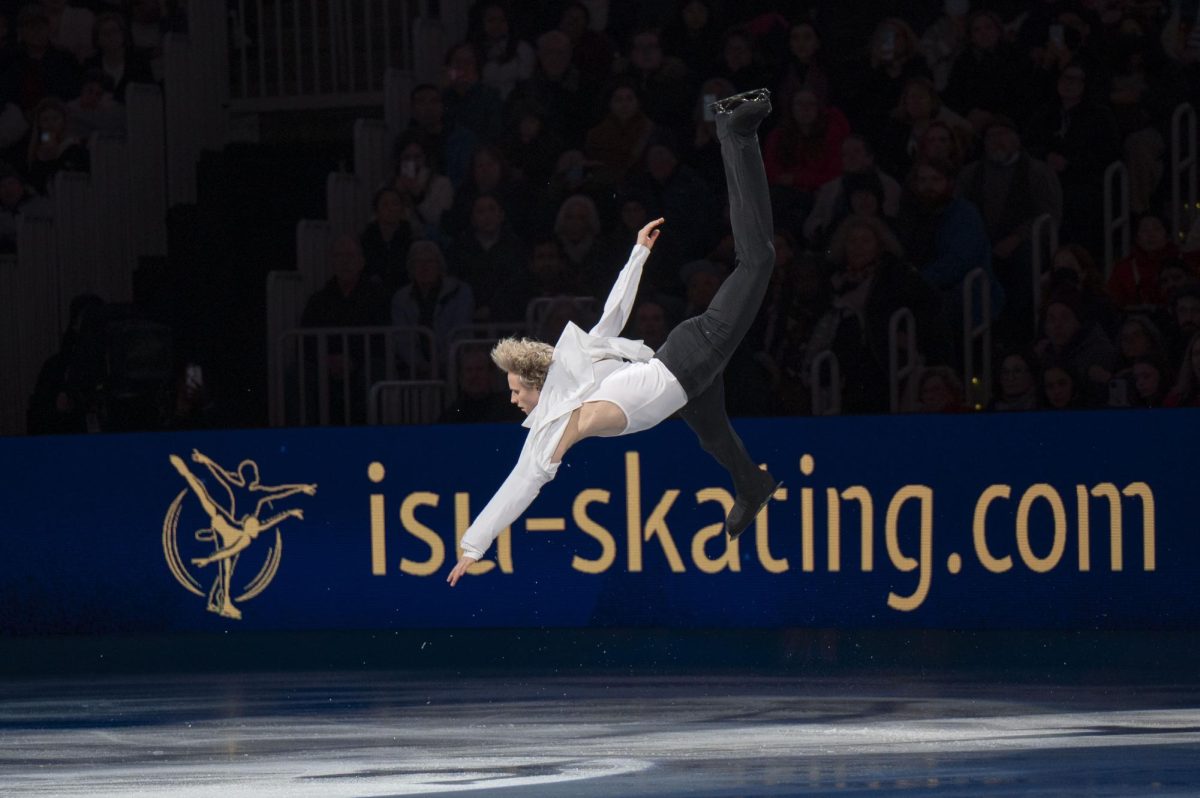 Ilia Malinin does a backflip on the ice during the Exhibition of Champions March 29. He performed in honor of the skaters lost in the Jan. 29 plane crash. (Jessica Xing)
Ilia Malinin does a backflip on the ice during the Exhibition of Champions March 29. He performed in honor of the skaters lost in the Jan. 29 plane crash. (Jessica Xing)
Malinin’s nearly flawless performance to “Running” by NF included technically difficult quad flips — jumping and completing four rotations mid-air — and step sequences that earned a standing ovation from the audience.
“It was very exciting to be skating here in Boston. I hadn’t even finished my program and the crowd was standing, and I was really happy about that,” Malinin said in an ISU press release.
Pairs free skate proceeded after the short program, entrancing audiences with beautiful synchronizations. Despite the U.S. taking no medals in the category, both Massachusetts teams Alisa Efimova and Misha Mitrofanov and Ellie Kam and Danny O’Shea secured two spots in the 2026 Olympics.
“To keep having those opportunities for more teams to go to Worlds and the Olympics — you get the experience sooner, you get the opportunity to grow, and then the country continues to have a better pair program,” O’Shea said at a press conference after their performance. “I’m just so happy and proud to be a part of that.”
Throughout the days of competition, vendors sold skates and mascot Boston Terrier plushies, and there were special fan features and live trivia games. Fans could also go to meet and greets with skaters like 2022 Olympic gold medalist Nathan Chen.
The third day was filled with anticipation for the women’s free skate, and the athletes did not disappoint. Sakamoto’s rendition of “All that Jazz” stunned the audience, but with her golden dress, gleeful smile and groovy choreography, Liu took home both the gold and champion title with a total score of 222.97. She became the first U.S. woman in 19 years to win a world title.
“I’m really glad I could do it [perform to “MacArthur Park Suite” by Donna Summer] as my free skate and end the competition off with that,” Liu said in a press conference after the victory ceremony. “I hope everyone remembers it.”
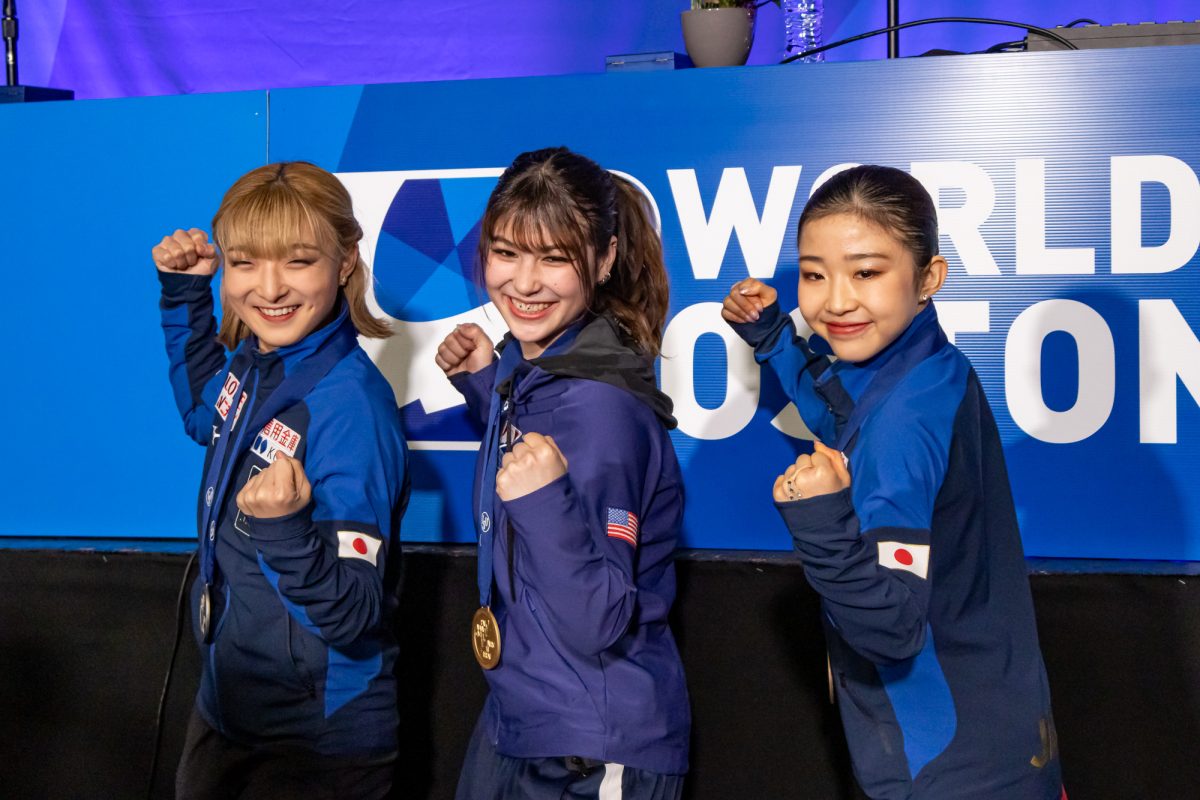 Women’s singles silver medalist Kaori Sakamoto, Liu and bronze medalist Mone Chiba (left to right) pose for a photo during a press conference March 28. After their respective victories, the trio hugged each other and celebrated their efforts. (Margot Murphy)
Women’s singles silver medalist Kaori Sakamoto, Liu and bronze medalist Mone Chiba (left to right) pose for a photo during a press conference March 28. After their respective victories, the trio hugged each other and celebrated their efforts. (Margot Murphy)
After her victory, the audience screamed in celebration, tossing plushies and waving American flags in excitement. These items were promptly picked up by “sweepers,” or amateur skaters who collect items thrown onto the rink.
Josiane Lamond, a Canadian sportswear designer, designed the sweepers’ costumes; she took inspiration from the Boston Tea Party uniforms and the “magic of skating” to create the dazzling, blue uniforms, according to Lamond.
She also designed both outfits for Sakamoto’s short and free skate programs.
“I feel privileged to be part of this world championship by designing for the athletes at the competition, but also the sweepers, because I got to meet wonderful people from the Skating Club of Boston,” Lamond said. “I was a bit in fear before coming because you never know, but it was just amazing.”
On the fourth day of the event, March 29, Northeastern University’s Nor’easters, an a capella group, sang “The Star-Spangled Banner.” Its harmonies and high notes garnered a resounding applause from the arena.
“It was an honor really, being able to walk out there and represent our group, our school, just everything and sing our hearts out in front of everyone and people who’ve come and dedicated their life to this sport,” said William Lui, a fourth-year computer engineering and computer science combined major at Northeastern and Nor’easters music director.
Similar in appearance to the pairs program, ice dance consists of two skaters performing a duet short and free skate program. The difference? Ice dance consists of more ballroom dance-like patterns and footwork with no throw jumps.
Free skate also allows skaters to more freely design a theme. For example, Great Britain’s James Hernandez dressed in a suit and performed a James Bond-themed program alongside Phebe Bekker.
US skaters Madison Chock and Evan Bates became the first team to win three world titles with their ice dancing program to “Take Five” by Dave Brubeck and Juju. Their jazzy choreography and incredible lifts propelled them to a gold-worthy score of 222.06.
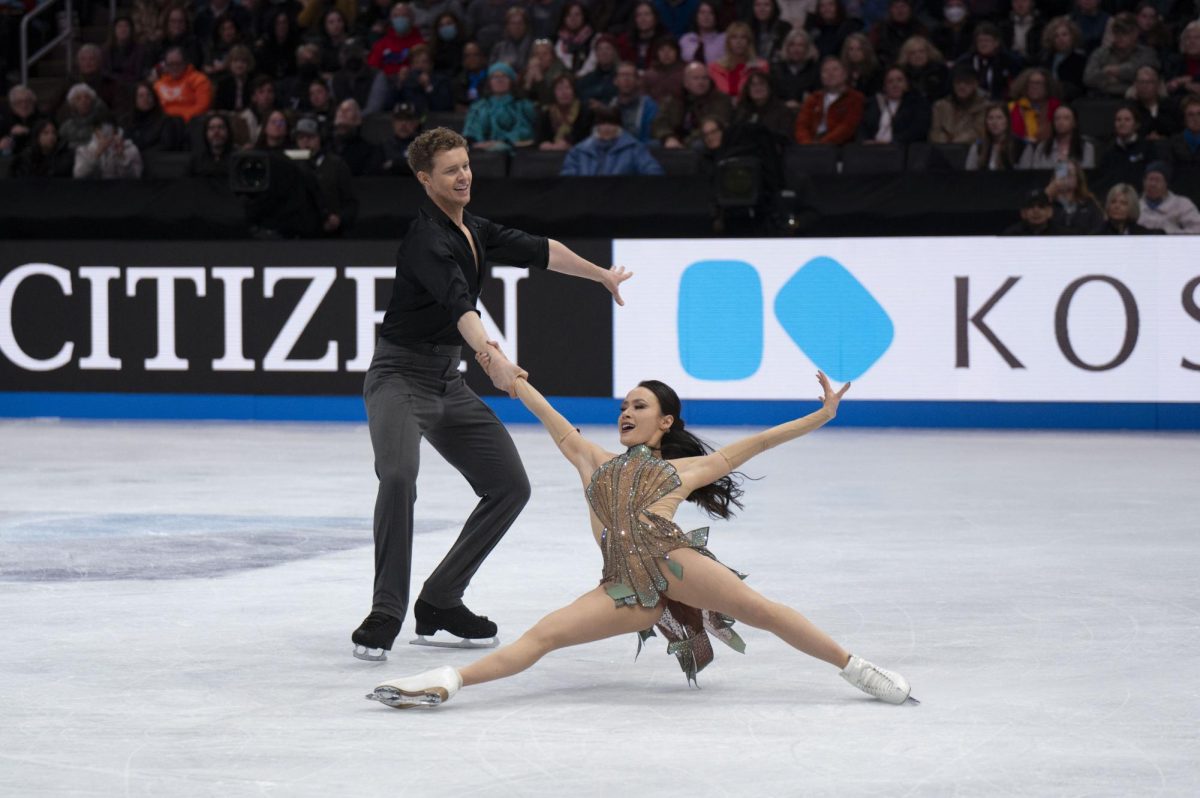 Evan Bates slowly glides Madison Chock in a circle during the ice dance free skate March 28. The couple was the first U.S. team to win three world titles. (Jessica Xing)
Evan Bates slowly glides Madison Chock in a circle during the ice dance free skate March 28. The couple was the first U.S. team to win three world titles. (Jessica Xing)
The final competition round of the ISU Championships, men’s free skate, packed TD Garden with fans, locals and admirers. Earning a total score of 318.56, Malinin’s performance to “I’m Not a Vampire” by Falling in Reverse ended the skating season in glimmering gold.
In celebration of the athletes and the end of the competition, March 30 featured an Exhibition of Champions including synchronized figure skating, choreography from local skaters and individual performances from medalists and acclaimed skaters.
It wasn’t only the professional ice skaters who made history, but the volunteers, sweepers, designers and diehard fans who etched the championships into Boston history.
“I think that the quality of the skating is just astounding. These pairs and the kind of difficulty they’re putting in their programs and the preparation that they’ve put into it — they’re so amazing,” said Boston resident and 1992 Olympic silver medalist Paul Wylie, who came to watch. “We used to say ‘Yeah, I’ll go do a quad axle’ and it was like ‘I’ll go fly to the moon,’ but now, there it is.”
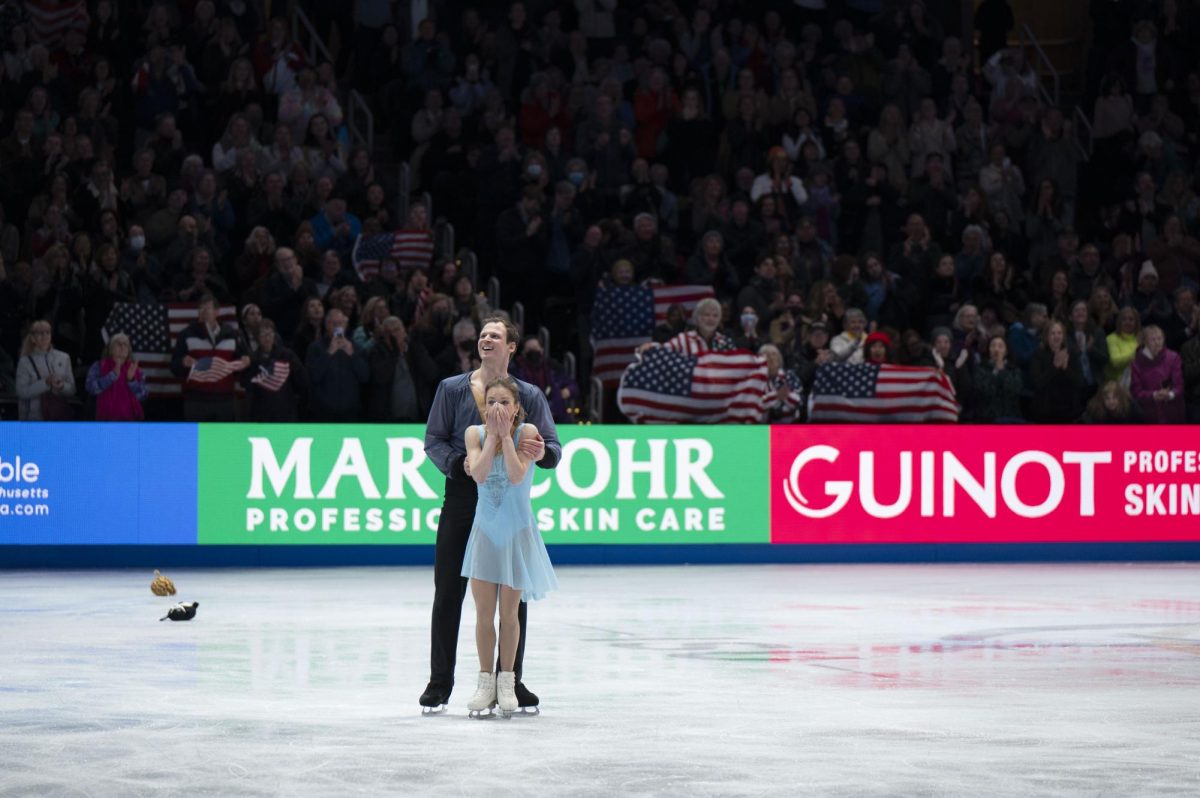
Gallery • 10 Photos
Jessica Xing
Alisa Efimova and Misha Mitrofanov gasp in awe at the audience’s resounding applause and support following their free skate performance March 26. Fans threw plushies onto the ice and showed off their country’s flag whenever a team from their nation performed.
News
NAKAKAGULAT! Ang Lihim na Panganib ng Paborito Nating Luyang Dilaw na Dapat Mong Malaman Agad!
NAKAKAGULAT! Ang Lihim na Panganib ng Paborito Nating Luyang Dilaw na Dapat Mong Malaman Agad! Naisip mo na ba kung bakit sa kabila ng araw-araw na pag-inom mo ng turmeric tea o paghahalo nito sa iyong mga lutuin ay parang…
Isang batang babae ang nawala mula sa kanyang bakuran noong 1999. Makalipas ang labing-anim na taon, natagpuan ito ng kanyang ina.
Isang batang babae ang nawala mula sa kanyang bakuran noong 1999. Makalipas ang labing-anim na taon, natagpuan ito ng kanyang ina. Noong Hunyo 15, 1999, ang tahimik na lungsod ng Riverside ay minarkahan ng pagkawala ng isang 18-taong-gulang na batang…
KARMA IS REAL: Asec. Claire, Sinampahan ng 10 Milyong Pisong Kaso ni Cong. Leviste! “Reyna ng Fake News” Daw?
KARMA IS REAL: Asec. Claire, Sinampahan ng 10 Milyong Pisong Kaso ni Cong. Leviste! “Reyna ng Fake News” Daw? Nayanig ang buong social media at ang mundo ng pulitika sa isang pasabog na balitang gumimbal sa ating lahat nitong nakaraang…
Babala sa mga Senior Citizens: Ang Delikadong Oras ng Paliligo na Maaaring Magdulot ng Atake sa Puso at Brain Hemorrhage—Isang 75 Anyos na Lolo, Hindi Na Nakalabas ng Banyo
Babala sa mga Senior Citizens: Ang Delikadong Oras ng Paliligo na Maaaring Magdulot ng Atake sa Puso at Brain Hemorrhage—Isang 75 Anyos na Lolo, Hindi Na Nakalabas ng Banyo Ang paliligo ay bahagi na ng ating pang-araw-araw na kalinisan at…
PINAGTAGO AKO NG ASAWA KO SA ILALIM NG KAMA HABANG KASAMA ANG KABIT NIYA. AKALA NIYA ISA LANG AKONG “DOORMAT”. NAKALIMUTAN NIYANG AKIN ANG LUPANG TINATAPAKAN NIYA…
PINAGTAGO AKO NG ASAWA KO SA ILALIM NG KAMA HABANG KASAMA ANG KABIT NIYA. AKALA NIYA ISA LANG AKONG “DOORMAT”. NAKALIMUTAN NIYANG AKIN ANG LUPANG TINATAPAKAN NIYA… Nakatiklop ako sa ilalim ng kama, pilit pinipigilan ang bawat hinga. Ang walong…
Akala namin ay isang kanlungan lamang ang aming natagpuan upang mabuhay. Ngunit sa ilalim ng mga ugat ng puno ay naroon ang isang sikretong ilang siglo na ang tanda. Isang kayamanan na nagpapakita ng pag-asa at kasakiman ng tao.
Akala namin ay isang kanlungan lamang ang aming natagpuan upang mabuhay. Ngunit sa ilalim ng mga ugat ng puno ay naroon ang isang sikretong ilang siglo na ang tanda. Isang kayamanan na nagpapakita ng pag-asa at kasakiman ng tao. …
End of content
No more pages to load

